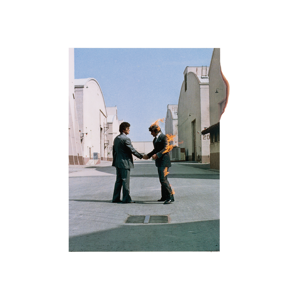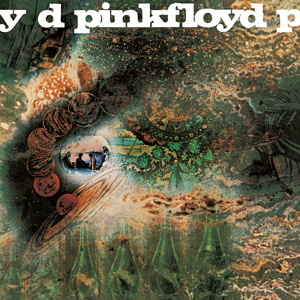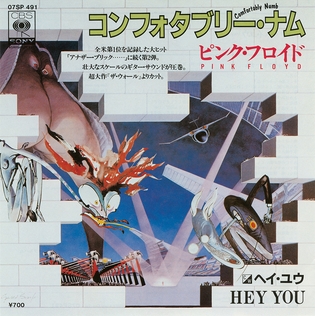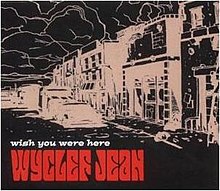
Animals is the tenth studio album by English rock band Pink Floyd, released on 21 January 1977 through Harvest Records and Columbia Records. It was self-produced at Pink Floyd's Britannia Row Studios in London throughout 1976. The album continued the long-form compositions that made up such previous works as Meddle (1971) and Wish You Were Here (1975).

Wish You Were Here is the ninth studio album by the English rock band Pink Floyd, released on 12 September 1975 through Harvest Records in the UK and Columbia Records in the US, their first for the label. Based on material Pink Floyd composed while performing in Europe, Wish You Were Here was recorded over numerous sessions throughout 1975 at EMI Studios in London.

A Momentary Lapse of Reason is the thirteenth studio album by the English progressive rock band Pink Floyd, released in the UK on 7 September 1987 by EMI and the following day in the US on Columbia. It was recorded primarily on the converted houseboat Astoria, belonging to the guitarist, David Gilmour.

A Saucerful of Secrets is the second studio album by English rock band Pink Floyd, released on 28 June 1968 by EMI Columbia in the UK and in the US by Tower Records. The mental health of singer and guitarist Syd Barrett deteriorated during recording, so guitarist David Gilmour was recruited; Barrett left the band before the album's completion.

"Shine On You Crazy Diamond" is a nine-part Pink Floyd composition written by David Gilmour, Roger Waters, and Richard Wright, which was first performed on Pink Floyd's 1974 French tour and appeared in Pink Floyd's 1975 concept album Wish You Were Here. The song is written about and dedicated to founder member Syd Barrett, who departed from the band in 1968 after dealing with mental problems and substance abuse.

"Comfortably Numb" is a song by the English rock band Pink Floyd, released on their eleventh studio album, The Wall (1979). It was released as a single in 1980, with "Hey You" as the B-side.
"The Great Gig in the Sky" is the fifth track on The Dark Side of the Moon, a 1973 album by English rock band Pink Floyd. The song features music by keyboard player Richard Wright and improvised, wordless vocals by session singer Clare Torry. It is one of only three Pink Floyd songs to feature vocals from an outside artist. The Great Gig in the Sky was released as a digital single in February 2023 to promote The Dark Side of the Moon 50th Anniversary box set.

"Money" is a song by English rock band Pink Floyd from their 1973 album The Dark Side of the Moon. Written by Roger Waters, it opened side two of the original album. Released as a single, it became the band's first hit in the United States, reaching number 10 in Cash Box magazine and number 13 on the Billboard Hot 100.

"Another Brick in the Wall" is a three-part composition on Pink Floyd's 1979 rock opera The Wall, written by bassist Roger Waters. "Part 2", a protest song against corporal punishment and rigid and abusive schooling, features a children's choir. At the suggestion of producer Bob Ezrin, Pink Floyd added elements of disco.

"Have a Cigar" is the third track on Pink Floyd's 1975 album Wish You Were Here. It follows "Welcome to the Machine" and on the original LP opened side two. In some markets, the song was issued as a single. English folk-rock singer Roy Harper provided lead vocals on the song. It is one of only three Pink Floyd recordings with a guest singer on lead vocals, the others being "The Great Gig in the Sky" (1973) with Clare Torry and "Hey Hey Rise Up" (2022) with Andriy Khlyvnyuk. The song, written by Waters, is his critique of the rampant greed and cynicism so prevalent in the management of rock groups of that era.

"Welcome to the Machine" is the second song on Pink Floyd's 1975 album Wish You Were Here. It features heavily processed vocals, layers of synthesizers, acoustic guitars as well as a wide range of tape effects. The song was written by bassist Roger Waters.

"Young Lust" is a song by the English rock band Pink Floyd, released in 1979. It is the ninth track on the band's eleventh studio album The Wall (1979). The lyrics to the song are about the band throwing themselves into the headlong of hedonism, sex, drugs, and rock and roll.

"Run Like Hell" is a song by English progressive band Pink Floyd, written by David Gilmour and Roger Waters. It appears on the album The Wall. It was released as a single in 1980, reaching #15 in the Canadian singles chart and #18 in Sweden, but it only reached #53 in the U.S. A 12" single of "Run Like Hell," "Don't Leave Me Now" and "Another Brick in the Wall " peaked at #57 on the Disco Top 100 chart in the U.S. To date, it is the last original composition written by both Gilmour and Waters, the last of such under the Pink Floyd banner, and is the last composition ever recorded by all four members of the classic 70s-era Floyd lineup together, within their traditional instrumental roles of Waters on bass, Gilmour on guitars, Nick Mason on drums, and Richard Wright on keyboards, on the same song.

"High Hopes" is a song by English rock band Pink Floyd, composed by guitarist David Gilmour with lyrics by Gilmour and Polly Samson. It is the closing track on their fourteenth studio album, The Division Bell (1994); it was released as the second single from the album on 17 October 1994. An accompanying music video was made for the song and was directed by Storm Thorgerson.
"Breathe" (sometimes called "Breathe (In the Air)") is a song by English rock band Pink Floyd. It appears on their 1973 album The Dark Side of the Moon.

"Arnold Layne" is a song by English rock band Pink Floyd. Released on 10 March 1967, it was the band's first single and was written by Syd Barrett.

"Learning to Fly" is a song by the English progressive rock band Pink Floyd, written by David Gilmour, Anthony Moore, Bob Ezrin, and Jon Carin. It was the first single from the band's thirteenth studio album A Momentary Lapse of Reason. It reached number 70 on the U.S. Billboard Hot 100 chart and number 1 on the Billboard Album Rock Tracks chart in September 1987, remaining three consecutive weeks at the top position in the autumn of the same year. Meanwhile, the song failed to chart on the official U.K. top 40 singles charts. On the other hand, in Spain, the song peaked at number 1 on the Los 40 Principales chart.

Pink Floyd are an English rock band formed in London in 1965. Gaining an early following as one of the first British psychedelic groups, they were distinguished by their extended compositions, sonic experiments, philosophical lyrics, and elaborate live shows. They became a leading band of the progressive rock genre, cited by some as the greatest progressive rock band of all time.

The Later Years is a box set by the English rock band Pink Floyd released on 13 December 2019 by Pink Floyd Records. It follows the 2016 box set The Early Years 1965–1972, and compiles Pink Floyd's work under the leadership of David Gilmour after the departure of Roger Waters in 1985.

"Hey, Hey, Rise Up!" is a song by the English rock band Pink Floyd, released on digital platforms on 8 April 2022. It is based on a 1914 Ukrainian anthem, "Oh, the Red Viburnum in the Meadow", and features vocals in Ukrainian by Andriy Khlyvnyuk of the Ukrainian band BoomBox.



















